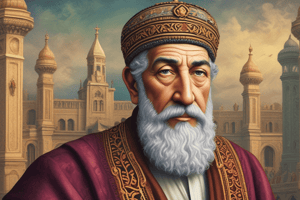Podcast
Questions and Answers
What was the primary focus of Maimonides in his philosophical works?
What was the primary focus of Maimonides in his philosophical works?
- Advocating for a mystical interpretation of Jewish law
- Integration of reason with contemporary scientific thought
- Reforming Jewish law to fit modern societal norms
- Demonstration of the logical coherence of Jewish beliefs (correct)
Which of the following best characterizes Mendelssohn's approach to Judaism?
Which of the following best characterizes Mendelssohn's approach to Judaism?
- Focusing solely on the mystical aspects of Judaism
- Emphasizing strict adherence to traditional practices
- Presenting Judaism as compatible with modern philosophy (correct)
- Rejecting engagement with non-Jewish culture
What was a key difference between Maimonides and Mendelssohn?
What was a key difference between Maimonides and Mendelssohn?
- Maimonides focused on philosophical inquiries, while Mendelssohn ignored philosophy
- Maimonides's work had no lasting impact on Jewish thought, unlike Mendelssohn's
- Maimonides lived during the Enlightenment, while Mendelssohn lived in the Middle Ages
- Maimonides sought to reconcile tradition with reason, while Mendelssohn integrated Judaism with modern ideas (correct)
What significant work is Maimonides known for that codifies Jewish law?
What significant work is Maimonides known for that codifies Jewish law?
How did Mendelssohn contribute to Jewish intellectual history during the Haskalah?
How did Mendelssohn contribute to Jewish intellectual history during the Haskalah?
What philosophical influence shaped Maimonides's beliefs?
What philosophical influence shaped Maimonides's beliefs?
What aspect of Judaism did Mendelssohn highlight in his rational interpretation?
What aspect of Judaism did Mendelssohn highlight in his rational interpretation?
What was a major concern for Maimonides in his engagement with Jewish law?
What was a major concern for Maimonides in his engagement with Jewish law?
Flashcards
Maimonides (Rambam)
Maimonides (Rambam)
A 12th-century scholar who emphasized the importance of reason and logic in understanding Jewish law and philosophy. His works, such as the Mishneh Torah and the Guide for the Perplexed, aimed to harmonize faith and reason.
Moses Mendelssohn
Moses Mendelssohn
A 18th-century philosopher who spearheaded the Haskalah (Jewish Enlightenment) movement. He advocated for the compatibility between Jewish tradition and modernity, emphasizing reason and intellectual advancement within Jewish life.
Mishneh Torah
Mishneh Torah
A comprehensive codification of Jewish law written by Maimonides. It aimed to organize and structure Jewish law into a systematic framework, making it accessible and comprehensible.
Guide for the Perplexed
Guide for the Perplexed
Signup and view all the flashcards
Haskalah
Haskalah
Signup and view all the flashcards
Key Difference: Maimonides vs. Mendelssohn
Key Difference: Maimonides vs. Mendelssohn
Signup and view all the flashcards
Maimonides' Goal
Maimonides' Goal
Signup and view all the flashcards
Mendelssohn's Goal
Mendelssohn's Goal
Signup and view all the flashcards
Study Notes
Maimonides (Rambam)
- Lived in 12th-century Spain and North Africa.
- Known for his Mishneh Torah, a comprehensive codification of Jewish law, and Guide for the Perplexed, a philosophical work exploring the harmony between faith and reason.
- Emphasized rational inquiry and philosophical engagement with Jewish texts.
- Sought a rigorous systematization of Jewish law (halakha) and philosophical thought.
- His philosophy, influenced by Aristotelianism, aimed to demonstrate the logical coherence of Jewish beliefs.
- Focused on the compatibility of Jewish law with reason and philosophical inquiry.
- Avoided extremes of mysticism or literalism in his philosophical views.
- Advocated for a reasoned understanding of Jewish law.
- His work profoundly impacted the development of Jewish thought for centuries.
Mendelssohn (Moses Mendelssohn)
- Lived in 18th-century Germany.
- A central figure in the Haskalah, the Jewish Enlightenment.
- Emphasized the compatibility of Judaism with modern philosophy and reason.
- Argued for Jews’ integration into the broader culture.
- Believed Jewish religious practice was compatible with intellectual advancement.
- Focused on a modern interpretation of Judaism, allowing for dialogue with non-Jewish culture.
- Tried to reconcile traditional Jewish beliefs with Enlightenment ideas, highlighting universal values in Jewish tradition.
- His approach stressed the internal consistency and rationality of Jewish law.
- His work stimulated dialogue between Judaism and contemporary thought, paving the way for subsequent Jewish reform movements.
Comparative Analysis: Maimonides vs. Mendelssohn
- The key difference lies in their historical contexts and purposes.
- Maimonides sought to integrate reason with existing tradition, systematizing law and deepening philosophical reflection within a pre-existing Jewish framework.
- Mendelssohn, in an era of burgeoning secularism and Enlightenment, focused on presenting Judaism as compatible with modern ideas and engaging in broader intellectual discourse.
- Both were committed to safeguarding faith but articulated their commitments differently.
- Maimonides addressed internal conflicts and religious comprehension. Mendelssohn engaged with external pressures and social challenges.
- While Maimonides focused primarily on philosophy and legal matters, Mendelssohn's work encompassed cultural, social, and political aspects of a growing secular European environment.
- Both used reasoned arguments to reinterpret and defend their faiths, but responded to different historical challenges.
- Both stressed human reason's role in comprehending religious doctrine while preserving core tenets of their faith.
Studying That Suits You
Use AI to generate personalized quizzes and flashcards to suit your learning preferences.




